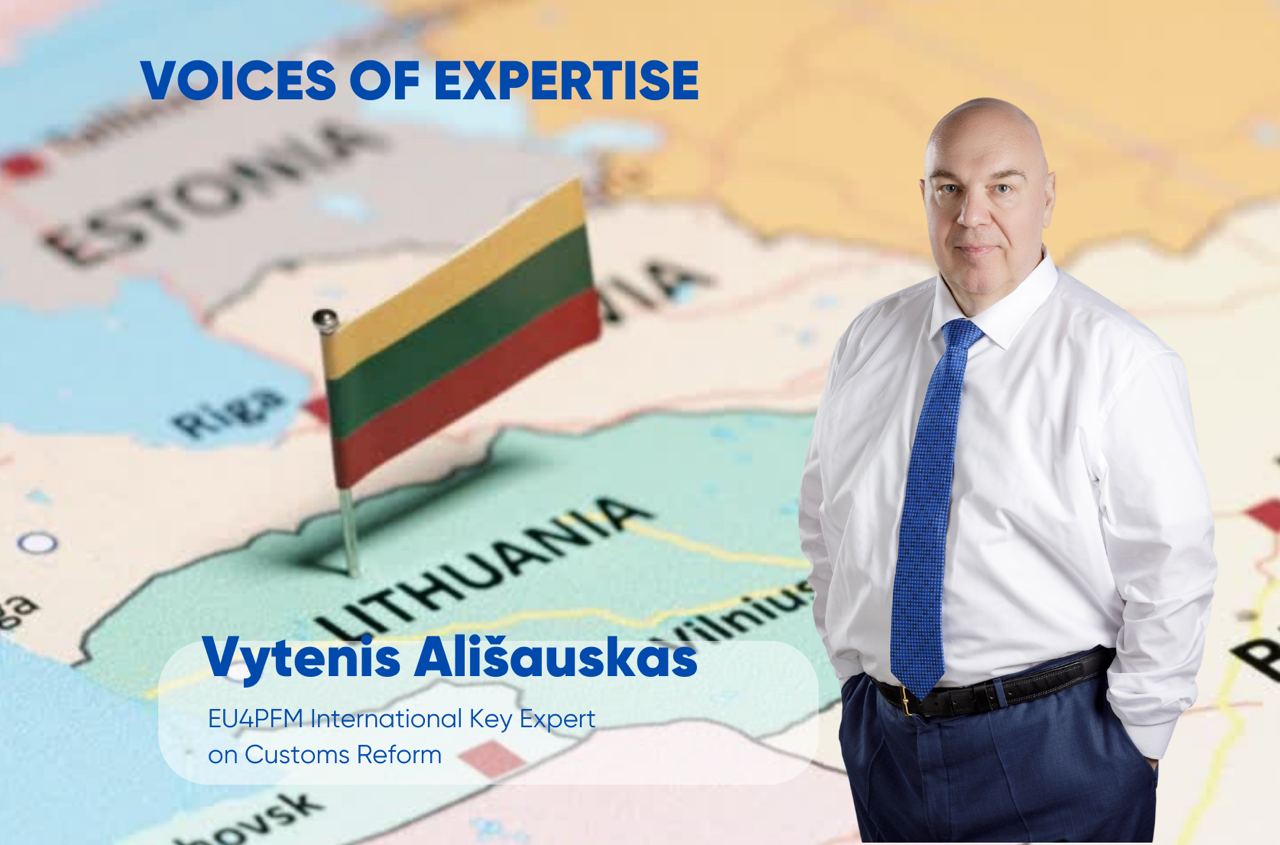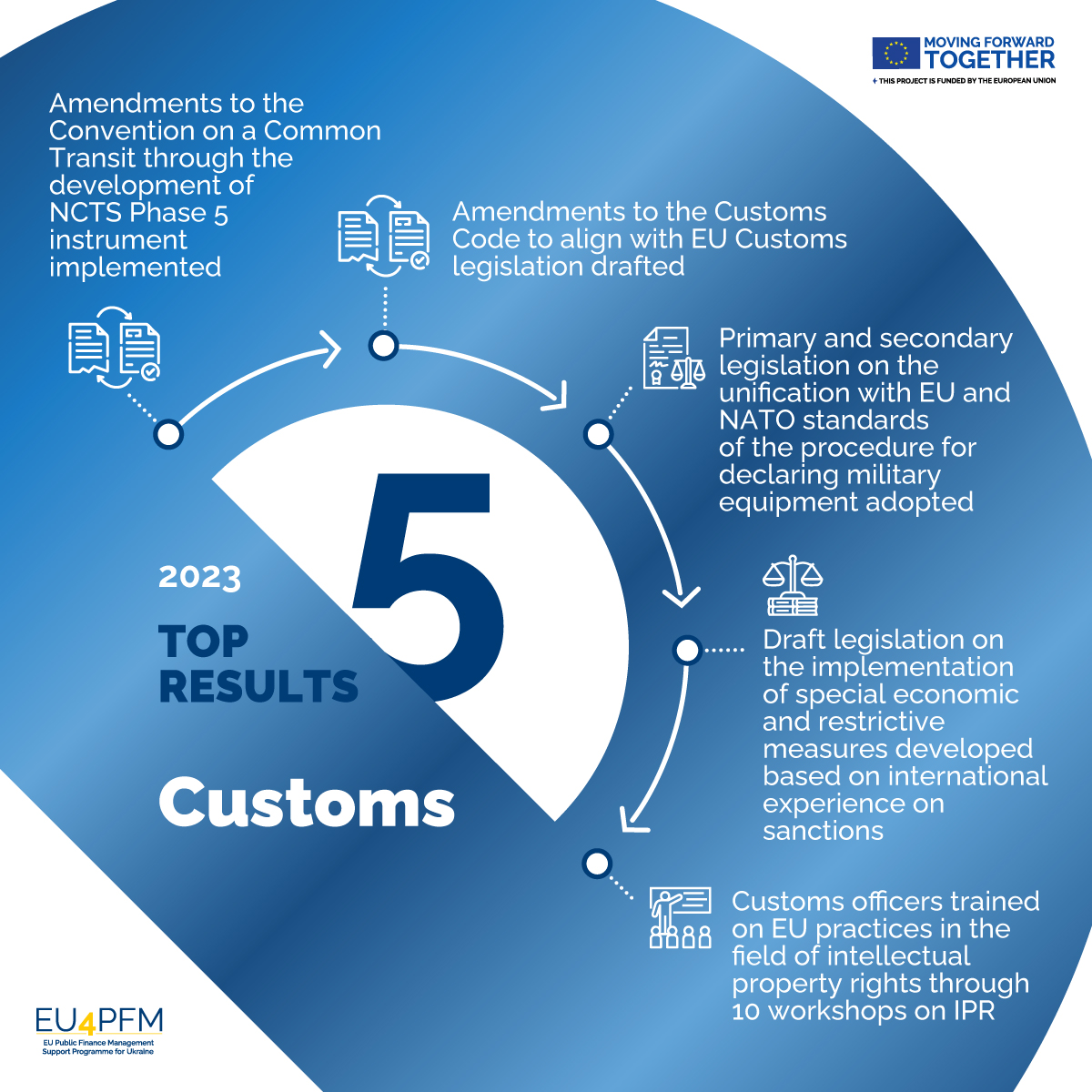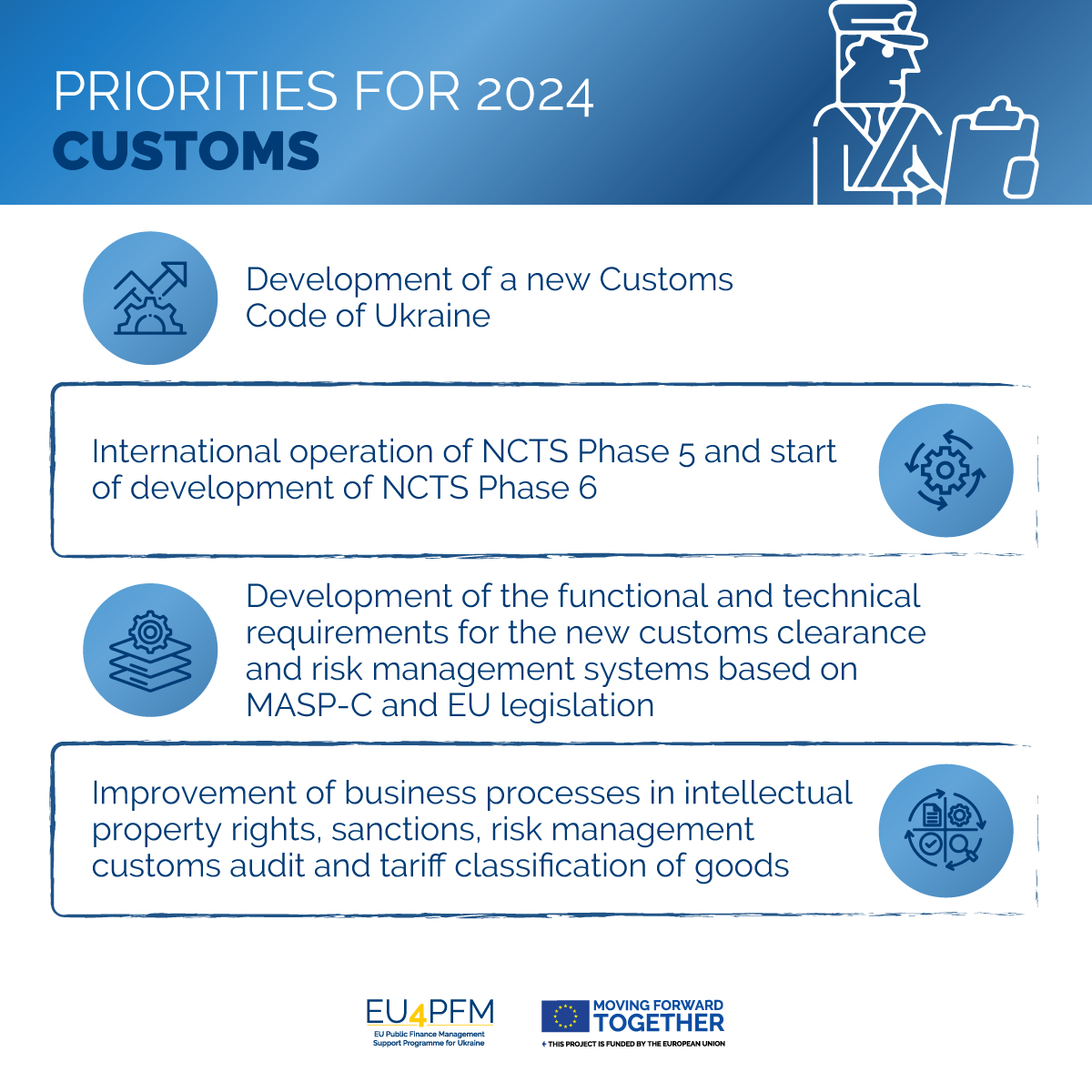“I consider myself Ukraine’s most ardent advocate, having never before witnessed such rapid reforms in international trade and customs, despite my involvement with Ukraine since 2007” – Vytenis Ališauskas
EU4PFM continues its interview series “Voices of Expertise”, featuring international experts who advocate for change and provide insights into transforming Ukraine’s Public Finance Management landscape. In this edition, we introduce our new interviewee, Vytenis Ališauskas, EU4PFM International Key Expert on Customs Reform.
— Could you please tell us about your professional background and how your career started?
I transitioned to the EU4PFM Project from Lithuanian Customs, where I served as the Deputy Head on IT and customs policy. However, my career did not start with customs at all.
After graduating from university, I had not anticipated working within state institutions. My academic focus was on industrial electronics. I wanted to do scientific work in medical electronics, including developing ultrasonic devices for cancer diagnostics.
Initially, I worked in the department’s laboratory and subsequently established a dedicated laboratory within a hospital, laying the groundwork for my intended research. This period coincided with the years 1985-90, a time marked by Perestroika, Lithuania’s independence, and the shift from a planned economy to a private enterprise system. At the request of the head of this hospital, I joined the hospital as an energy engineer, even though I could have been a scientist. The hospital’s management asked me to set up a digital centre, first to register patients. That’s how my exit from science came about.
I started to create a small IT centre, the size of which was very ridiculous, it consisted of three computers, but at that time the head of the hospital was very proud that his hospital was the only one that had such a centre in Kaunas.
As the demand was great, I opened a private company with my friend. We started to develop software for medical institutions. Also in those times, after the coup, a book or printed word was very important. And we started to make another software – Lithuanian fonts for laser printing devices, which appeared at that time. We won the competition (tender) and started to produce a daily newspaper under contract within the city.
I vividly recall that competition where, as two recent university graduates, around the age of 25, my colleague and I presented our case. With minimal fanfare, devoid of elaborate presentations or formalities, we set up all our equipment on the floor and demonstrated our capabilities by swiftly producing a sample article in laser font, impressing the decision-makers. This triumph led to the awarding of the contract and effectively streamlined the daily newspaper production process by three hours.
So, with our technology, we produced a newspaper on a daily basis. This gave us a great insight into all the news and announcements that were going to be published the following day.
— Great advantage indeed! Are you from Kaunas?
Yes, I was born in Kaunas, graduated from university here, and have always lived here. I never imagined that my path would lead me anywhere else.
— What did you dream of being when you were a child?
When I was a kid, I loved playing with anything related to a steering wheel – cars and bicycles. I can’t say that I dreamed of being a driver, but it all came from my childhood. Now, I drive for leisure. If I have to go somewhere, I prefer to drive. I enjoy driving more than being a passenger.
— How did you find your way into the customs sphere? What happened next?
While working for the newspaper, our city had come to recognize our company as a serious IT company. One day, a comrade approached me with news that the Lithuanian Customs Service was being established. This was during the early stages of Lithuania’s independence. The customs post was on the border with Poland. They had bought computers, but the staff were not sufficiently trained to work with them. And at the request of this colleague, who in turn was asked by the head of customs, I went to the border, set up the infrastructure, and provided training. However, that was not enough. So, I started going there twice a week on a contract basis. Gradually, I became more deeply involved, developing specialised software for monitoring goods export and combating smuggling. This marked our first attempt at risk management.
As the demand for my involvement increased, I transitioned to full-time work at the customs office, initially as a software engineer and subsequently as the head of the IT department of the regional customs office, which was in the process of merging. By 1998, a centralization project had commenced in Vilnius, necessitating my regular presence there. Subsequently, I assumed the role of Deputy Head of the IT Customs Centre under the Customs Department. Before Lithuania acceded to the EU, the implementation of IT systems, including the well-known New Computerised Transit System (NCTS), was imperative.
During 2002-2004, the Convention on a Common Transit Procedure transitioned from paper-based to electronic, necessitating training in Brussels before our membership. This experience was eye-opening. We thought we were making quality software ourselves, and we even tried to fight a little bit. That is why I now understand our Ukrainian colleagues very well because I was once in the same position.
Subsequently, I assumed the role of a national project manager, with considerable authority and representing Lithuania in my domain. This was a significant change for me, offering valuable insights into the practices of other countries.
NCTS, as the pioneer among electronic customs systems, laid the groundwork for the development of subsequent export and import control systems. I am grateful for having been part of this formative phase, as it provided me with a profound understanding of both the system itself and the principles governing the construction of IT systems within the European Union. This knowledge continues to be instrumental in my current role.
— To conclude, how long have you been working in the customs area?
I commenced my career in 1991 and remained in the role until 2019 (the start of the EU4PFM Project). Although I think I am still working in the sector today. So, it’s quite a long time.
— Have you had any prior experience working in Ukraine or with Ukrainian customs authorities?
In 2007, I was approached by a colleague who had worked on various projects in Ukraine and Moldova. He told me about a US programme aimed at implementing anti-corruption measures and offered me a chance to join.
In my opinion, the root of corruption in customs is unclear procedures; if there are many of them, they are complicated, and not properly described. Using NCTS as an example, I proposed implementing a clear and well-defined system for transit procedure first, then expanding to other procedures. The advantage of NCTS lies in its clearly defined rules and processes, eliminating the need to “invent” anything – it can simply be adopted and implemented. This marked the beginning of my involvement in US projects in Ukraine and Moldova.
Even then, the goals were to bring customs legislation as close as possible to that of the EU and to base transit in Ukraine on the principles of NCTS. That is, in 2007-2011 we started to familiarise our colleagues from Ukraine with all the peculiarities of EU legislation: what is Single Administrative Document, NCTS, what are the risks.
After the end of this project, in 2015, I became a short-term expert in another project where, at the request of DG TAXUD, my task was to promote NCTS and the Convention on a Common Transit Procedure. This period coincided with the nascent phase of customs’ engagement with the European integration process, serving as a preparatory phase for the work we are currently engaged in.
— What motivated you to become involved in the EU Public Finance Management Programme for Ukraine as an International Key Expert on Customs reform?
I saw the opportunity to join the EU4PFM Programme as a chance to complete the work, as my ambitions with this Project were high – it was not only to implement NCTS and join the Convention but also to support Ukraine in preparation for EU membership.
An important advantage of EU4PFM was not only the theoretical part with seminars but also the availability of a budget for IT implementation. This meant that it was possible to start from scratch and bring it to the joining Convention. However, to be honest, few people believed that this part of the plan would come to fruition. I was a cautious believer, although I was well aware of what had to be done.
Of course, the success of these initiatives extends beyond just the Project donors. The desire for reform from the Ukrainian authorities plays a significant role. In my view, key changes began in Ukraine with the election of a new President and Parliament in 2019. However, reforms are not driven by individuals alone; they are implemented by dedicated teams at the Ministry of Finance, Customs Service, and experts from the Reform Support Team. This cohesive team boasts extensive expertise and a clear understanding of their goals. At that time, I was truly impressed by the swift and diligent support for these reforms from all stakeholders. So, the main task for us was to seize this moment.
This is how I came to work in Kyiv. The Ministry of Finance and the State Customs Service, with whom I had established strong relationships through prior projects, provided invaluable support. We seamlessly resumed collaboration with our partners, all with a clear understanding of where we were and where we needed to go next.
As a result, we joined the Convention on a Common Transit Procedure and implemented NCTS Phase 5 even faster than some other EU countries. This is why I now proudly consider myself Ukraine’s most ardent advocate, having never before witnessed such rapid reforms in international trade and customs, despite my involvement with Ukraine since 2007. It is inspiring to continue our efforts.
— How can partners be persuaded to embrace new changes?
From an expert’s standpoint, I would emphasise three key principles. Firstly, it is crucial to have a clear vision of the desired outcome and to take full responsibility for its realisation, rather than merely offering external advice.
Secondly, once the vision and priorities are established, it is important not to yield at the first sign of resistance. Persistence is key. Grant partners time to process and accept the changes. Patient reminders and step-by-step guidance will be essential.
Finally, a clear understanding of the situation is crucial. Analyze and assess the risks involved, then don’t be afraid to take calculated ones. It is also important to provide unwavering support to partners to ensure they feel confident in your reliability.
— Do you notice any differences in mentality and values when you work with Ukrainian partners?
My experience of working with Ukrainian counterparts is similar to my previous collaboration with colleagues in Lithuania. Both the Ministry of Finance and Customs have a wealth of expertise, and I have had the pleasure of working with many professionals.
Similar to our experience, they encountered procedures that initially seemed illogical. Like us, they initially believed their existing systems were superior. However, the key difference lies in the shift towards new principles and approaches. The emphasis has moved from customs acting as a barrier to international trade to one that facilitates and encourages good business practices. This shift aligns perfectly with what we experienced in Lithuania, and understanding their initial resistance allows me to better support them on their journey.
— How do you approach a communication impasse with various partners?
It depends on what kind of impasse it is and what the price is. If you see that you can’t do anything, don’t waste your time. If you see that there is a way to do something, you should take it to the top and try to get people with higher authority to make the right decision. But this will not take long, the best thing is patience and persuasion. If you can’t get an agreement this month, raise the issue next month. If it’s important, you can’t back down.
— For you personally, what are the achievements that you are proud of during the whole Project period?
Firstly, Ukraine’s accession to the Convention on a Common Transit Procedure stands out as a significant milestone. Dubbed as a “mini-EU accession”, this achievement encompasses crucial components. It involves the preparation of requisite legislation as the initial step, followed by the implementation of IT solutions mirroring those of the EU. For instance, the NCTS must align entirely with the EU in terms of structure, message processes, and the introduction of new structural units and roles (such as office of guarantee, office of transit and Help Desk, which actually will serve as IT service management for all systems in the future). Another notable achievement is the recent implementation of NCTS Phase 5, which places Ukraine on par with EU countries in this regard.
From a customs perspective, this achievement alone justifies the initiation of the EU4PFM Project. This is the victory that we were very carefully considering from the outset.
Secondly, the introduction of changes in customs legislation, aligning with EU best practices, such as the introduction of authorised economic operators, guarantees, intellectual property rights, and simplification of procedures aimed at combating corruption, is a significant achievement.
Looking ahead, our current key priorities encompass the adoption of the new Customs Code of Ukraine, implementation of NCTS Phase 6, and the development of customs IT systems, taking into account the European multi-annual strategic plan for customs (MASP-C). These endeavours reflect our ongoing commitment to further advancements in the customs area.
— How do you measure the success and impact of customs reforms? Are there specific indicators or benchmarks you use to assess progress?
It is always good to have an external assessment of progress. We are talking about the European Commission’s assessment through the enlargement report. This is a very good benchmark, as the European Commission has experience in asking the right questions and in assessing the current situation on the basis of the answers.
In the IT realm, international testing plays a vital role. For instance, conformance testing, as conducted for the NCTS system, ensures compatibility with EU standards. As systems evolve, conformity testing under frameworks like the Combined Communication Network (CCN) and Customs Control System Interface (CSI Link) will become increasingly important.
— How to ensure that all the knowledge and changes we have introduced and made available to partners during the project will continue to be useful after the Programme ends?
Keep and record the material we have shared with our partners, ensure its accessibility, and guarantee that individuals in need are aware of its location and how to retrieve it.
— The customs field is rapidly evolving with the integration of technology. How is Ukraine leveraging technological advancements to modernise its customs procedures and systems?
Ukraine, like Lithuania, boasts highly skilled IT departments within its Customs Service. However, as time progresses and IT demands grow in complexity, maintaining a large pool of specialised IT staff can become increasingly challenging. Another point, Customs is not an IT research institute – it has to fulfil its customs functions, and IT tasks should be handled by those for whom it is their main job.
Lithuania’s experience serves as a good example. We reached a point where IT consolidation became a strategic necessity. Initially, regional customs houses established their own IT centre. This was followed by a broader consolidation effort encompassing all state IT services. This shift allowed us to leverage the expertise of IT companies in implementing efficient solutions.
Given Ukraine’s similar context, particularly within the framework of European integration, I believe the same approach to IT consolidation would be highly beneficial.
— How do you manage to maintain a healthy work-life balance? Tell us about your hobbies.
Being able to switch from work is important and everyone should definitely do it. In my student days, running was my passion. Now, for heart rate monitoring, I prioritise daily walks between 2 and 4 kilometers. Strength training was another student favourite, but today, my exercise routine focuses on swimming and kinesitherapy exercises. While the form has changed, sport remains a vital part of my life.
Beyond exercise, I’m a devoted fan of funny cars – Volkswagen Beetles, or Käfers. Here in Lithuania, I belong to a club dedicated to these iconic cars. I have such a one, and together with the club, we participate in various city events: festivals, parades, and exhibitions. Sometimes, we simply use them for scenic drives to castles, or for casual outings with tents and good company.
— How do you deal with stress?
Here are a few ideas:
Get away. Take a walk, ideally in nature, such as in the woods, mountains, or by the water. Make time to relax and clear your head. Don’t dwell on your stressors. That’s how it slowly goes away.
Humour can also be a powerful tool. It’s a quick way to relieve stress, not only for yourself but also for those around you.
Blitz
— What personal philosophy or guiding principles do you apply to your work?
Know what you want. If you recognize its importance, don’t procrastinate; pursue it. However, this principle does not extend to trivial matters.
Uphold honesty; refrain from lying.
Humour – it should always be in your pocket. When used appropriately, it is a valuable asset.
— In your estimation, when will there be an international application of NCTS Phase 6 in Ukraine?
My estimation is that this will occur in the first half of 2025.
— When do you think Ukraine will join the EU?
As an expert on customs reforms, I can say that the customs stream should be ready for accession in 2030.




